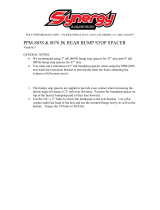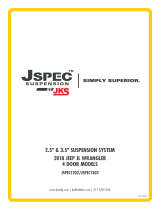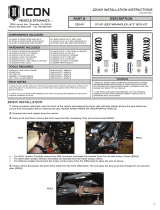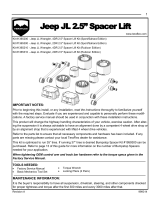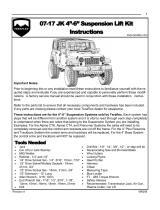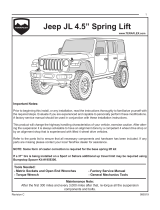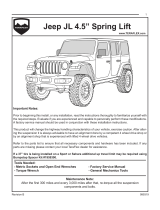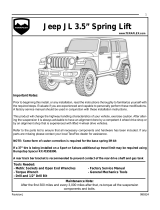Page is loading ...

INSTALLATION GUIDE
2.5” DUALSPORT
SUSPENSION™
FOR JEEP GLADIATOR
AEV30399AA
Last Updated: 09/16/20

ii
PLEASE READ BEFORE YOU START
To guarantee a quality installation, we recommend reading these instructions thoroughly
before beginning any work. These instructions assume a certain amount of mechanical
ability and are not written nor intended for someone not familiar with auto repair.
INCLUDED PARTS QTY REQUIRED TOOLS
Springs 4Basic Standard and Metric Hand Tools
Shocks 4Drill Motor
Driveshaft Carrier Bearing Spacer 313/32” Drill Bit
Front Sway Bar End Links 2Jack and Jack Stands
Rear Sway Bar End Links 2
Front Upper Bumpstop Spacer 2
Rear Lower Bumpstop Spacer 2
Rear End Link Relocation Bracket 2
Front Spring Shim 1
Rear Track Bar Tower Bracket 1
Geometry Correction Bracket Kit 1
Hardware Pack 1
AEV ProCal SNAP w/Harness 1
AEV Jack Base 1
Vehicle Applications: 2020-Current Jeep Gladiator (JT)
Vehicle Assumptions: Stock JT frame and axles with all stock brackets intact Stock Front and Rear Driveshafts
NOTE: Aftermarket units with double-Cardan joints will require a rear axle pinion angle adjustment that is NOT
provided in these systems.
NOTE: 32–35 PSI is AEV’s recommended tire pressure with our DualSport SuspensionTM Systems.
Aftermarket Wheels: These are recommended both for adequate width to mount large tires and decreased
backspacing for chassis and steering clearance. AEV wheels are optimized to work with this suspension system
for maximum clearance to chassis components and vehicle body/flares.
NOTE: Wheels with extremely negative oset may negatively aect ESP.
Install Time: Approximately 5 hours.

1
AMERICAN EXPEDITION VEHICLES
I. REAR SUSPENSION
1. Raise the Jeep, supporting the frame using jack stands or a hoist, so that the rear axle may be lowered
enough to remove the springs. Support the axle using a floor jack under the center of the axle.
2. Remove the wheels.
3. Loosen but DO NOT REMOVE all 8 control arm bolts (fig. 1).
4. Loosen but DO NOT REMOVE the Track Bar hardware (fig. 2).
Figure 1: Left side shown.
Figure 2: Axle side (left) Frame side (right)

2
AMERICAN EXPEDITION VEHICLES
5. Un-clip the parking brake cable from bracket at the axle to allow movement (fig. 3).
Figure 3
6. Remove the Calipers from the hubs to allow for axle droop.
7. On Rubicon models, remove the rear most retainer holding the locker cable to the frame (fig. 4) to al-
low for axle droop.
Figure 4

3
AMERICAN EXPEDITION VEHICLES
8. Remove the shocks and SAVE HARDWARE (fig. 5).
Figure 5
9. Remove sway bar end links and SAVE upper mounting hardware (fig. 6).
Figure 6
10. Use pry bar to carefully bend passenger rear frame end brake line bracket outward 1/4”–5/16” (fig. 7).
This is needed to clear the track bar bracket after relocation bracket is added. Then unbolt brake line
brackets from frame on both sides and SAVE HARDWARE.
Figure 7

*Refer to Appendix for proper torque specs
4
AMERICAN EXPEDITION VEHICLES
11. Carefully lower the axle until you can remove the springs. Use CAUTION not to overextend the e-brake
or other wiring. Remove the factory isolator from the top of each spring.
12. Install the factory spring isolator to the top of the AEV spring (fig. 8). Be sure the spring is properly seated
into the notch on the isolator. Lower the axle until the isolator and AEV spring can be installed, again
being careful not to stress the brake hose or ABS wiring. Now that they’re unbolted from the frame they
can be flexed slightly. Be sure the molded post on the isolator goes into the hole in the spring pad at the
frame for proper orientation. Raise the axle to keep the spring in place.
Figure 8
13. Drill the factory holes in the bump stop pads to 13/32”. Treat with rust preventative. Install AEV bumpstop
spacers on the axle using the supplied M10 flat head, countersunk bolts and flange nuts (fig. 9). Tighten
bolts until slight deformation around the holes in the spacer occurs, do not tighten excessively or split-
ting could occur. NOTE: The longer side of the spacer should be toward the rear of the vehicle
Figure 9

*Refer to Appendix for proper torque specs
5
AMERICAN EXPEDITION VEHICLES
14. Remove axle end track bar bolt and SAVE HARDWARE (fig. 10).
Figure 10
15. Install AEV track bar tower in orientation shown (fig. 11). Use the AEV supplied M14 bolt and crush sleeve
in the factory location with factory flag nut. Use the provided U-bolt around axle tube. Once both pieces
are started, torque U-bolt nuts to 43 lb-ft. Torque the M14 bolt to 130 lb-ft.
Figure 11

*Refer to Appendix for proper torque specs
6
AMERICAN EXPEDITION VEHICLES
16. Reinstall the track bar at the upper hole in the AEV bracket using the factory bolt and washer with sup-
plied M14 nut. LEAVE LOOSE until vehicle is sitting at ride height (fig. 12.)
Figure 12
17. Install AEV Rear Shocks (PN:33-312200), body up in the factory locations using the factory hardware (fig.
13). Torque upper hardware to 80 lb-ft and lower to 75 lb-ft. Reinstall parking brake cables and calipers.
Figure 13

*Refer to Appendix for proper torque specs
7
AMERICAN EXPEDITION VEHICLES
18. Install End links and Brake Lines.
A. Install end link/brake line brackets on vehicle as shown (fig. 14) using factory brakeline bracket hard-
ware and factory upper end link hardware. Torque M12 end link bolt to 81 lb-ft and M6 bolt to 15 lb-ft.
B. Install brake line bracket to forward upper set of holes (fig. 14). Alignment tab will go into lower hole
and provided M6 bolt will go through both brackets. Nut can be installed to rear of brackets using box
end M10 wrench. Torque to 15 lb-ft.
C. Install AEV end links to lower holes in the brackets using the provided M12 x 60mm flange bolts and
nuts (fig. 14). Install lower studs to axle mounts using provided M12 nuts (factory end link nuts are dif-
ferent thread pitch). Torque all end link hardware to 81 ft-lb.
FRONT
FRONT
FACTORY HARDWARE
AEV HARDWARE
Figure 14
19. Remove driveshaft pillow block from frame. Install three (3) provided spacers with supplied M10 x 50mm
bolts. This will help improve driveline angle and prevent vibration. Torque bolts to 50 lb-ft (fig. 15).
Figure 15

*Refer to Appendix for proper torque specs
8
AMERICAN EXPEDITION VEHICLES
FRONT SUSPENSION
1. Raise Jeep and support the frame using jack stands or a hoist, such that the front axle can be lowered
enough to remove the springs. Support the axle by placing the floor jack under the center of the axle.
Remove the wheels.
2. Loosen but DO NOT remove all 8 control arm bolts (Fig 15).
Figure 15: Frame-side (left) Axle-side (right)
3. Loosen but DO NOT remove both track bar bolts (Fig 16).
Figure 16: Axle-side (left) Frame-side (right)
4. Disconnect brake line brackets at frame, electrical connector for axle disconnect, and push fastener for
axle disconnect to allow extra droop (Fig 17).
Figure 17: Brake Line Bracket (left) Axle Disconnect (right)

*Refer to Appendix for proper torque specs
9
AMERICAN EXPEDITION VEHICLES
5. Remove both sway bar links and hardware, save hardware. Note orientation, new links will be installed in
the same way (Fig 18).
Figure 18
6. Remove shocks and save all shock mounting hardware.
7. Bend brake line brackets on lower control arms flat/up to allow extra travel relative to frame (Fig 19). On
vehicles that will be rock crawling, AEV suggests trimming o the bottom tab of these brackets below
the mounting hole to eliminate a snag point.
TRIM (OPTIONAL)
TRIM (OPTIONAL)
Figure 19: Before (left) After (right)
8. Lower axle and remove springs. DO NOT remove factory isolator.

*Refer to Appendix for proper torque specs
10
AMERICAN EXPEDITION VEHICLES
9. Install upper bumpstop extensions.
A. Remove urethane bumpstops from inside spring towers. These simply press into place, so remove
them by wiggling them downward and sideways, or carefully prying with large channel locks (Fig 20).
B. Reinstall urethane bumpstops into new aluminum extensions (Fig 20). Lube them with glass cleaner or
detergent to make install easier.
Figure 21
C. Install extensions into factory bumpstop mounts. Using magnet or socket extension, install M12x25
flange bolt from top of spring tower (Fig 22). Torque bolts to 40 ft-lb
Figure 22

*Refer to Appendix for proper torque specs
11
AMERICAN EXPEDITION VEHICLES
10. Install springs
A. Remove passenger lower spring isolator by carefully prying it upward away from axle. Install front
spring shim to bottom of isolator, passing molded stud through hole in shim. Reinstall assembly onto
axle spring seat (Fig 23). There is more weight on right side of vehicle than left, so this helps it sit level.
Shim sits underneath isolator on axle.
Figure 23
B. Install Front AEV springs making sure to properly index them on the lower isolators. Be careful the
springs don’t snag the thin outer lip of the isolators. If the upper isolators fall out during assembly or
disassembly, reinstall them by making sure the top locating posts pass through the holes in the spring
tower. Raise axle to retain springs in place.
11. Install new front shocks at upper and lower mounts using factory hardware (PN 33-310473). Shock body
sits at the top with AEV graphic facing outward from vehicle.
12. Install sway bar end links
A. For each side attach the upper end stud to the sway bar in the same manner as the original front links
had been (nut on frame side of bar). NOTE: The upper stud has a dierent thread than the rest of the
M12 fasteners in the suspension—it is a “standard” pitch versus a “fine pitch.” Tighten to 40 lb-ft. (Fig. 24).
B. The lower ends of the links will attach in the factory location using the original hardware. NOTE:
Early models did not include a bolt with integrated washer on the driver side from the factory. If not
equipped with the large washer, use AEV provided washer added to the inboard side of driver side link
only (Fig 24). Washer is not needed on passenger side because it has brackets on both sides of bush-
ing. Torque to 40 lb-ft.
M12 Washer
M12 Washer
Figure 24

*Refer to Appendix for proper torque specs
12
AMERICAN EXPEDITION VEHICLES
13. Reinstall wheels and tighten lug nuts, working in a “star pattern.”
14. Install Stamped Geometry Correction Brackets (refer to the instructions for this product, PN:AEV30413).
NOTE: If the Jeep has an aftermarket front driveshaft and/or is going to be used for significant rock-crawling,
it is recommended to swap the upper control arms side-to-side. They are normally bent down and inboard
to clear the frame, but once lowered this bend gets closer to the front axle pinion/yoke on the driver’s side.
Swapping is possible once lowered and will improve clearance to the pinion yoke area.
15. You may now tighten all fasteners to factory specifications.* Too tight is NOT just right.
TIP: It is good practice to mark each major bolted suspension connection such as these with a paint pen.
Draw a line that runs from bolt head or nut to the adjacent bracket material. This will allow a visual inspec-
tion to easily catch bolts that work loose. After approximately 100 miles, you should perform a complete
visual inspection and re-torque any suspect bolts as well as your wheel lug nuts.
AEV recommends having a professional alignment done at this point.
AEV recommends the use of the provided ProCal SNAP to calibrate for the new tire size. Please follow the
instructions that come with your ProCal SNAP.
AEV recommends 32–35 PSI tire pressure with our Suspension Systems.

13
AMERICAN EXPEDITION VEHICLES
JT FACTORY TORQUE SPECIFICATIONS
APPENDIX
JOINT TORQUE (lb-ft)
Front UCA to Axle 80
Front UCA to Frame and AEV Brackets 80
Front LCA to Axle 190
Front LCA to Frame and AEV Brackets 190
Front Brake Hose to LCA 15
Front Track Bar to Axle 110
Front Track Bar to Frame 110
Front Sway Bar Link to Axle 60
Front Sway Bar Link to Sway Bar 60
Front Lower Shock to Axle 75
Front Upper Shock to Frame 80
Rear UCA to Axle 111 plus 90°
Rear UCA to Frame 111 plus 95°
Rear LCA to Axle 111 plus 60°
Rear LCA to Frame 111 plus 65°
Rear Track Bar to Axle and AEV Brackets 41
Rear Track Bar to Frame 41
Rear Sway Bar Link to Axle 81
Rear Sway Bar Link to Sway Bar 70
Rear Lower Shock to Axle 89
Rear Upper Shock to Frame 89
/
